|
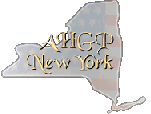 |

Part of the American
History & Genealogy Project |
West Point and the Lower Hudson

Securing the control of the Hudson River
was a favorite project with the British as its possession would
enable them to cut the colonies in twain and subdue each section
in turn. Not only would the control of the Hudson enable them to
open a road to Montreal and so cut off the New England colonies,
but once in possession of Albany they would easily overrun the
Mohawk valley, give encouragement to the many Tories there, and
be in close touch with their Indian allies, the Iroquois.
The Americans were as anxious to prevent
the control of the Hudson by the British, as the latter were to
secure it. After extended investigation it was decided that West
Point offered the best location for defensive works. The river
was very narrow there, not much over fourteen hundred feet wide
; the banks were high ; mountains overlooking the river on all
sides ; and at this point the river bent almost at right angles
so that cannon would control for a long distance, and
obstructions to navigation could easily be placed and
maintained. Beside all these advantages there was a high, rocky
island in the river just above West Point that could be
fortified readily. The plan of West Point below makes the
situation clear.
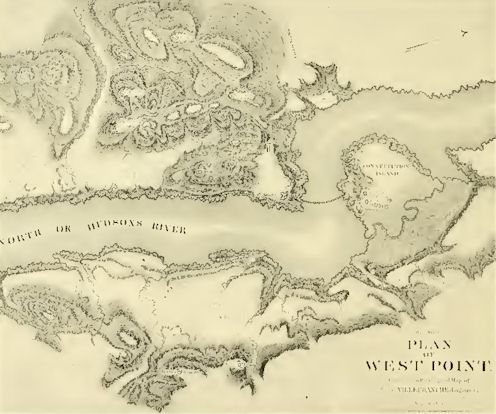
Plan of West Point
The occupation of West Point by the
Americans was a constant menace to New York, therefore the
British had a double reason for desiring possession of the
Hudson. The struggle for West Point enabled Arnold to carry into
effect the treasonable purposes he had for some time
entertained. There is in all American history no sadder incident
than that of Arnold's treachery. A strong, brave man, who had
made a fine record as a soldier, by a single act destroyed for
all time all the esteem in which he had been held. While the
treason of Arnold can never be forgotten nor condoned, one
cannot forget the part he took at Quebec, and at Saratoga, nor
can one overlook the fact that he was not always treated fairly.
Benedict Arnold was a descendant, and
namesake, of one of the early governors of Rhode Island. Young
Arnold began business as an apothecary, and later added to his
enterprise the selling of books and stationery. At the outbreak
of the Revolution he marched to Cambridge in the command of a
company. He was with Allen at Ticonderoga, and wherever he was
he was in the thickest of the fight. By many he was regarded as
the hero of Saratoga.
Arnold was not advanced as rapidly as he
felt he should be, and on several occasions he was deeply
humiliated, but had there not been a lack in his character,
somewhere, we should not now have to tell the story of his
treason. While Arnold was at Philadelphia he married Margaret
Shippen, a daughter of one of the Tory residents of the city.
Arnold, who was always fond of display, lived far beyond his
means at this time. He kept a coach, servants in livery, gave
splendid banquets, and in such ways incurred debts that he could
not meet. He was accused of raising money in improper ways, and
on being tried was acquitted on two charges, but found to be
guilty in some measure on others. A part of the court before
whom he was tried voted to cashier him, but the majority decided
that he should be reprimanded by his Commander-in-Chief.
Washington performed this duty with all possible delicacy, for
he had always been a friend of Arnold's, and he did not believe
there had been any wrong intent. This was the condition of
affairs that existed when Arnold sought the command at West
Point, which Washington gladly gave him. Even at this time
Arnold had been in treasonable correspondence with the British.
The picture is the blacker because Arnold sought this position
that he might betray not only his country, against which lie
thought he had grievances, but his commander as well, who had
always been his friend, and who had done all that he could to
shield him from criticism, and to promote his interests.
While at West Point Arnold occupied as
his headquarters the Beverley Robinson House, which was situated
on the east bank of the Hudson, nearly opposite West Point, and
at the foot of Sugar Loaf Mountain. The house was built about
1750 by Colonel Beverley Robinson, son of John Robinson,
President of the colony of Virginia. The grounds contained about
a thousand acres. The estate came to Robinson through his wife,
a daughter of Frederick Philipse. During the Revolution Robinson
sided with the British and raised a regiment of loyalists for
the British service. At the close of the war his estate was
confiscated. The house was destroyed by fire in 1892, being at
that time the property of Hamilton Fish. Washington was at this
house frequently, and Putnam and other American officers made
their headquarters there. It was at this house that Washington
had the sad interview with the almost distracted Mrs. Arnold
after the discovery of the treason of her husband. It was to
this house that Roger Morris and his wife came when they were
obliged to flee from New York when that city was occupied by the
American troops. It was at this house that Hamilton and
Lafayette were at dinner when they received the dispatch
announcing the capture of Major Andre.
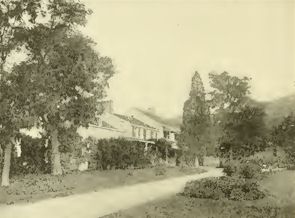
The Beverley Robinson House
André
A correspondence had been carried on
between Andre and Arnold for some time, Andre writing over the
signature John Anderson, while Arnold signed himself "Gustavus."
It became necessary to have a meeting between Arnold and someone
who could speak for Sir Henry Clinton with authority. Major
Andre was chosen to act in that capacity. It was at first
planned to have the meeting take place at Dobb's Ferry, and
Arnold went down the river in his barge for that purpose, but
owing to some misunderstanding his boat was fired upon and he
was compelled to withdraw. He returned to West Point, and Andre,
who was at Dobb's Ferry, went back to New York.
The first effort to bring about a
meeting had resulted in failure. There was further
correspondence, after which Andre went up the river as far as
Teller's Point, where, on board the Vulture, he waited until a
meeting with Arnold could be arranged. Arnold was aided in this
matter by Joshua Hett Smith, who lived on the west side of the
river, about two and a half miles below Stony Point. His house
has long been known as the "Treason House," because Arnold and
Andre met there and arranged their plans for the surrender of
West Point. To what extent Smith was in the confidence of Arnold
will probably never be known. Whether Smith was a Tory, or
whether he was deceived by Arnold, will always be a matter of
some doubt.
On Thursday, the 21st of September,
1780, at about midnight, Smith, with two of his tenants acting
as boatmen, rowed out to the Vulture. Andre was brought ashore
and met Arnold about two miles below Haverstraw, at the foot of
Long Clove Mountain. The two men talked together till morning,
when, not having completed their plans, they went to Smith's
house, Andre going very reluctantly. As they reached the house
they heard the sound of cannonading. Colonel Livingston, who was
in command at Verplancks Point, had opened fire on the Vulture,
which he compelled to drop down the river. Arnold and Andre
remained in consultation nearly all day. At the close of their
conference Arnold returned to the Robinson House in his barge,
having given passports to Andre which would enable him to pass
the American lines at that point.
Arnold's movements caused no suspicion
as he had accounted for them in advance in a very plausible way.
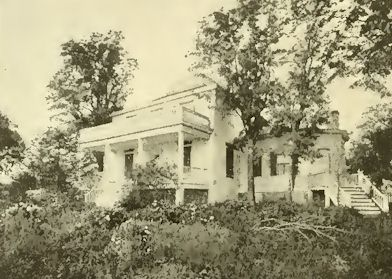
Treason House
The Vulture, after having been driven
down the river, returned and waited for Andre, but Smith for
some reason would not row him out to the vessel. Being compelled
to attempt his return by land Andre, with Smith for a guide, set
out on horseback a little before, sunset. Andre changed his
military suit for citizen's clothes which Smith furnished. They
went up the river as far as King's Ferry, where they crossed
over to Verplancks Point. From this point they went to Compound,
where they were stopped by a sentinel who insisted upon seeing
their pass. They remained over night with one Andreas Miller and
set out early in the morning, taking the road to Pine Bridge.
When within two miles of this place they stopped and took
breakfast with a Mrs. Sarah Underhill. Here Smith left and
hastened back to the Robinson House to report Andre's movements
to Arnold.
It had been planned to have Andre go
from Pine's Bridge to White Plains, but he heard such reports as
to the safety of the route that he changed and took the road to
Tarrytown instead. When near the latter place he was halted by
three men, John Paulding, David Williams and Isaac Van Wart. The
following quotations from the testimony which these men gave
later is of interest. Paulding said:
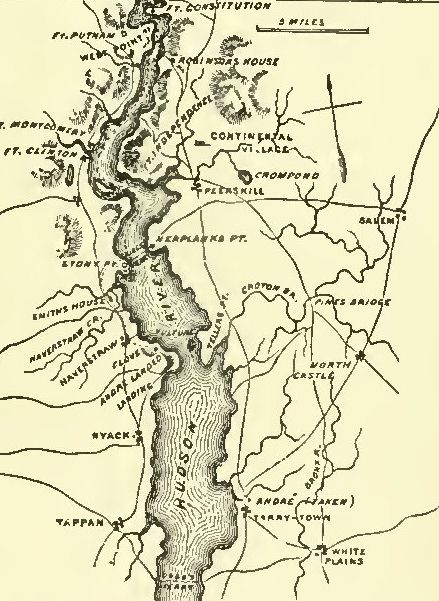
Movements of Arnold and Andre
"Myself, Isaac Van Wart and David
Williams were lying by the side of the road about half a mile
above Tarrytown, and about fifteen miles above Kingsbridge, on
Saturday morning, between nine and ten o'clock, the 23rd of
September. We had lain there about an hour and a half, as near
as I can recollect, and saw several persons we were acquainted
with whom we let pass. Presently, one of the young men who were
with me said, 'There comes a gentleman-like looking man, who
appears to be well dressed, and he has boots on, and you better
step out and stop him, if you do not know him.' On that I got up
and told him to stand, and then asked which way he was going.
Then he said, 'I am a British officer, out in the country on
particular business, and I hope you will not detain me a
minute,' and to show that he was a British officer he pulled out
his watch. Upon which I told him to dismount. He then said, 'My
God! I must do anything to get along,' and seemed to make a kind
of a laugh of it and pulled out General Arnold's pass, which was
to John Anderson to pass all guards to White Plains and below.
Upon that he dismounted. Said he, 'Gentlemen, you had best let
me go, or you will bring yourselves into trouble, for your
stopping me will detain the general's business;'" and he said he
was going to Dobb's Ferry to meet a person there and get
intelligence for General Arnold. Upon that I told him I hoped he
would not be offended; that we did not mean to take anything
from him: and I told him there were many bad people on the road,
and I did not know but perhaps he might be one."
Williams gave the following testimony:
"We took him into the bushes and ordered him to pull off his
clothes, which he did; but, on searching him narrowly, we could
not find any sort of writings. We told him to pull oft' his
boots, which he seemed to be indifferent about; but we got one
boot oft' and searched in that boot and could find nothing. But
we found that there were some papers in the bottom of his
stocking next to his foot; on which we made him pull his
stocking oft, and found three papers wrapped up. Mr. Paulding
looked at the contents and said he was a spy. We then made him
pull oft' his other boot, where we found three more papers at
the bottom of his foot within his stocking. Upon this we made
him dress himself, and I asked him what he would give us to let
him go.
He said he would give us any sum of
money. I asked him whether he would give his horse, saddle,
bridle, watch, and one hundred guineas. He said 'Yes,' and told
us he would direct them to any place, even if it were that very
spot, so that we could get them. I asked him whether he would
not give us more. He said he would give us any quantity of dry
goods, or any sum of money, and bring it to any place we might
pitch upon, so that we might get it. Mr. Paulding answered, 'No,
if you would give us ten thousand guineas you should not stir
one step.' I then asked the person who had called himself John
Anderson if he would not get away if it lay in his power. He
answered, 'Yes, I would.' I told him I did not intend he should.
While taking him along we asked him a few questions and we
stopped under the shade. He begged us not to ask him questions
and said when he came to any commander he would reveal all."
The papers found on Andre showed the
number and the distribution of the troops at West Point, the
positions they would occupy in case of an attack, the location
of the different forts and batteries, with the men and guns for
the defense of each, and all such other information as an enemy
would desire to have. Arnold agreed that in case an attack was
made on West Point he would scatter the forces and so arrange in
other ways that no effective defense could be made.
Andre was taken to North Castle, the
nearest military post, and turned over to the commander,
Lieutenant-Colonel Jameson, who, unaccountable as it may seem,
after reading the papers found on Andre, decided to send him to
Arnold in charge of Lieutenant Allen. He did so, writing a
letter to Arnold, saying that he had sent the captured papers to
Washington. Soon after Andre left Major Tallmadge, the second in
command at North Castle, learned what had been done. He declared
that he was suspicious of Arnold and urged that Andre be brought
back. To this Jameson gave a reluctant consent. The next day
Major Tallmadge took Andre to Lower Salem and left him in charge
of Lieutenant King. From here Andre was sent to the Robinson
House, then to West Point, and from there to Tappan, where he
was confined till his trial. General Washington had been at West
Point only a short time before the meeting of Arnold with Andre.
He had gone on to Hartford and was to stop at West Point on his
return from that place. He was back at West Point on the 24th of
September, the day that the British had been expected to make
their attack, for the scope of Arnold's treason contemplated the
capture of Washington as well as West Point.
Washington returned from Hartford by the
way of Fishkill. Soon after leaving the latter place he met the
French Minister, Luzerne, with his suite, and was persuaded to
return with them in Fishkill and spend the night there. Early
the following morning Washington and his staff were on their way
to West Point, intending to breakfast with Arnold at the
Robinson House, but as they approached the place Washington took
another road, and Lafayette said, "General, you are going in the
wrong direction." Washington replied humorously. "Ah, I know,
you young men are all in love with Mrs. Arnold, and wish to get
where she is as soon as possible. You may go and take your
breakfast with her and tell her not to wait for me, for I must
ride down and examine the redoubts on this side of the river,
and will be there in a short time." However, the officers
accompanied Washington, with the exception of two aids, who, at
the request of Washington, rode on to notify Mrs. Arnold of the
cause of the delay.
Breakfast was waiting when the aids
arrived, and those present sat down. During the meal a letter
from Colonel Jameson was handed to Arnold. It was the one
Jameson wrote two days before, announcing the capture of Andre.
Arnold asked to be excused, saying he was needed at West Point
immediately. To his aids he said, "Say to General Washington
that I have unexpectedly been called over the river and will
return very soon." He went to his wife's room and sent for her.
Lie told her that he must leave at once, and that they might
never meet again, that his life depended upon his reaching the
British lines before he was detected. Mrs. Arnold fainted.
Leaving her in that condition Arnold hurried down stairs,
mounted a horse and rode at full speed to the bank of the river,
where his boat lay. He entered it and directed the men to row
rapidly down the river, telling them that he was going on board
the Vulture with a flag of truce, and that he was in great
haste, as he was expecting Washington and wished to return as
soon as possible.
Washington arrived at the Robinson House
just after Arnold left. He received Arnold's message, took a
hasty breakfast, and went over to West Point to meet him, and
was greatly surprised to find that Arnold was not there, and had
not been for two days, and that the officer in charge had not
heard from him in that time. Washington inspected the works and
returned to Arnold's for dinner. As he was walking up from the
dock he met Hamilton, who told him of Arnold's treason and
flight. Calling upon Knox and Lafayette for counsel, Washington
said. "Whom can we trust now?" Hamilton was sent immediately to
Verplanck's Point in the hope of intercepting Arnold, but the
traitor was already on board the Vulture.
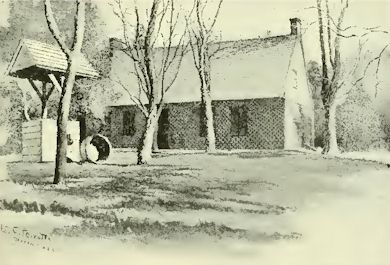
Washington's Headquarters at Tappan
Washington could not know whether or not
others were involved in Arnold's treason, but he decided to take
all the officers into his confidence. This was greatly
appreciated by them, the more so because circumstances were
somewhat against Jameson, and one "or two others, though all
were innocent of any wrong act.
Andre did not seem to fear death
greatly, but he dreaded to die the death of a spy, and begged
that he might be shot instead of being hanged. Every one
sympathized with him, but it seemed necessary that an example
should be made of him, the more so that his case was very
similar to that of Hale, for whom no mercy had been shown.
Capture of Major André
At Tappan André was confined in a stone
mansion, afterward occupied as a tavern by Thomas Wandle. His
trial took place in the old Dutch church.
The Americans made strenuous efforts to
capture Arnold, but without avail, General Clinton and other
British officers pleaded earnestly for Andre's release, which of
course could not be granted. Arnold wrote a letter to Washington
threatening in case Andre was executed to retaliate upon every
American whom he might afterward capture. Arnold's course after
his treason did quite as much toward blackening his memory as
did his treason itself.
André was arrested near Tarrytown on the
23rd of September, and was executed at Tappan on the 3rd of
October of the same year.
André was tried by a board of fourteen
general officers, Lafayette, Greene, Stirling and Steuben being
among the number. He was declared to be a spy and condemned to
suffer the death of one.
His execution took place in the presence
of the army, on the summit of a low hill about a quarter of a
mile to the west of Tappan. A monument has been erected at
Tarrytown to the memory of John Paulding, David Williams and
Isaac Van Wart, the captors of Andre.
A monument to the memory of Williams has
been erected on the grounds of the old fort at Schoharie, he
having been a resident of Schoharie County for many years before
his death. The Corporation of the City of New York erected a
monument to the memory of John Paulding in the graveyard of the
little church on the Van Courtlandt Manor, about two miles west
of Peekskill. In 1829 the citizens of Westchester County erected
a monument at Greenburgh in memory of Isaac Van Wart. While
these men and their acts are kept in remembrance by the monument
erected in their honor at the place where André was captured,
the people among whom they lived also honored their act and
commemorated their memory by suitable monuments.
The Military School at West Point
Washington, mindful of the fact that a
large portion of his trained officers during the Revolution were
chosen from the ranks of foreign soldiers, because we lacked men
who had had military training, urged in his message of 1798 the
establishment of a military academy. Congress being then, as
often, very dilatory, nothing was done at that time toward
acting upon Washington's recommendation. In 1798, 1800 and 1801
some provision was made for the instruction of cadets, but it
was not until 1802 that the Military Academy can fairly be said
to have come into existence, and it led a very feeble life till
1812; in fact, there was not a single cadet at West Point at the
time of the declaration of war between Great Britain and the
United States.
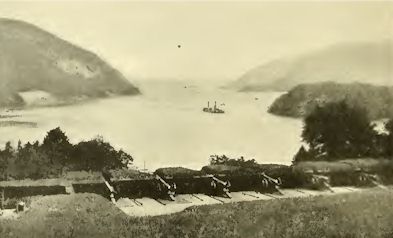
Looking North from West Point
At this time Congress was willing to
act, and provision was made for two hundred and fifty cadets. It
was provided that admission to the Academy should be determined
by examination, which had not previously been required.
Major Thayer was made the Superintendent
of the Academy in 1817 and he held the position for sixteen
years. To him, far more than to anyone else, is due the credit
for the general plan of the school.
The usefulness of the Academy was fully
justified during the Civil War, for although only the merest
fraction of the officers engaged on either side had had any
military experience, a very large portion of those who achieved
eminence during the conflict owed their success to the training
they received at West Point. This fact is shown by the careers
of Grant, Lee, McClellan, Jackson, Sherman, Johnston, Burnside,
Beauregard, Hooker, Pemberton, Sheridan, Longstreet, Thomas,
Bragg, Halleck, Rosecrans, Early, Buel, Buckner, and many
others.
The Academy has grown continually in
equipment and in efficiency. There are now more than one hundred
fifty buildings of various kinds in use and Congress has
appropriated several millions for further improvements.
Kingston
Our state government was organized at
Kingston in 1777. It was there on the 30th of July, 1777, that
George Clinton was declared elected the first governor of the
state. Kingston received its first charter from Governor
Stuyvesant in 1661. Kingston was the first capital of the state,
and at the time it was made the capital had about twenty-five
hundred inhabitants, being the third city of the state in
population.
In 1776 the General Assembly of New York
changed its title to "Convention of Representatives of the State
of New York." The body appointed a committee to draft a
constitution for a state government and then adjourned to meet
in the city of New York on the 8th of July, but the appearance
of Howe before that date prevented the meeting. The convention
held short sessions at Harlem, White Plains and Fishkill, and
then adjourned to meet at Kingston, where they reassembled in
February 1777, and continued in session till the following May.
They met in a stone building that is sometimes called the
Constitution House and sometimes "Old Senate House." Here the
first constitution for the state of New York was adopted. John
Jay was the chairman of the committee that drafted it and the
work was mainly his. The draft of the constitution was submitted
to the convention on the 12th of March. It was very fully
discussed and was adopted on the 30th of April, 1777. The work
of drafting this constitution was so well done that we lived
under it for forty-seven years, very few amendments being made
during that time. This constitution was printed in pamphlet form
at Fishkill by Samuel Loudon, on the only press in the state to
which the patriots had access at that time. It is a matter of
some interest that this was the first book printed in the state.
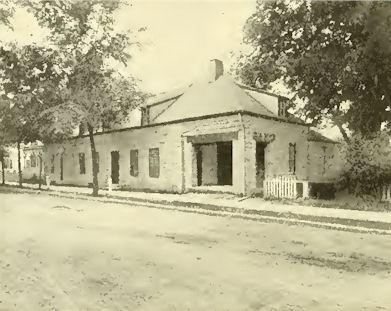
Constitution House at Kingston
At the time of the advance of Sir Henry
Clinton, in 1777, Fort Putnam was not yet completed, and there
was no other fort at West Point on the west side of the river.
Fort Constitution was opposite West Point on what is now known
as Constitution Island. Forts Montgomery and Clinton were
opposite Anthony's Nose. Clinton easily made his way up the
river. With him was General Vaughn with a force of thirty-six
hundred men. All the vessels on the river were destroyed, and
the houses of prominent Whigs were burned. The expedition
reached Kingston on the 13th of October, 1777. A force was
landed and the city was burned, only a few stone buildings
escaping destruction. It was supposed that Clinton would go on
up to Albany, but for some reason he went down the river again,
and the surrender of Burgoyne a few days later made it
impossible for Clinton to hold any part of the river above West
Point.
Albany
This place was first known as Beverwyck
(sometimes spelled Beaverwyck), then as Willemstadt and finally
as Albany. It was incorporated as a city by Governor Dongan in
1686.
A little church was built at Albany
about 1657. In 1715 this was replaced by the one shown in the
illustration below. It was located in the open space bounded by
State, Market and Court streets. The following is from Watson's
"Sketches of Olden Times in New York": ''Professor Kalm who
visited Albany in 1749, has left us some facts. All the people
then understood Dutch. All the houses stood gable end to the
street; the ends were of brick, and the side walls of plank or
logs. The gutters on the roofs went out almost to the middle of
the street, greatly annoying travelers in their discharge. At
the stoopes (porches) the people spent much of their time,
especially on the shady side, and in the evening they were
filled with both sexes. The streets were dirty by reason of the
cattle possessing their free use during the summer nights. They
had no knowledge of stoves, and their chimneys were so wide that
one could drive through them with a cart and horses."
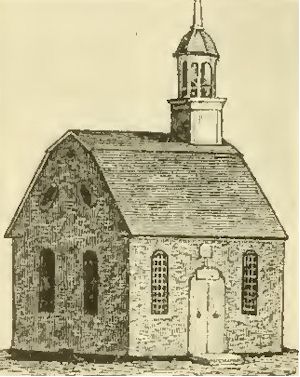
Ancient Dutch Church at Albany
Albany was the natural gateway to the
north and west. This gateway had to be held against the French
and Indians in the early days, and later against the British and
the Six Nations. From the earliest times Albany has been a place
of great importance. It is said to be the second oldest existing
settlement in the original thirteen colonies. In 1524 Verrazano
went up the Hudson, and not long after some French traders built
a fortified trading post on Castle Island. Hudson did not come
till eighty-five years later. At the time that the French first
came to the vicinity of Albany it would have been vastly more
proper to have spoken of America as the "Dark Continent" than to
have applied that name to Africa fifty years ago.
When Albany became a city in 1686 it was
second in population and resources to New York only, and hardly
second to it in importance. For a century and a half everything
to the west and north of Albany, save the little hamlet at
Schenectady, and the French settlements on the St. Lawrence, was
an unbroken wilderness.
In the early days not only the peace and
comfort, but the actual existence of Albany was dependent upon
the friendship of the Six Nations. This was very carefully
cultivated by the Dutch. Once, at a council fire, a Mohawk
sachem gave Albany the name of "The House of Peace."
During the French wars Albany was a
storehouse for munitions of war, and the rendezvous for troops.
It was one of the busiest places on the continent.
In 1754 a convention of colonial
delegates was held at Albany for the avowed purpose of renewing
treaties with the Six Nations, but also with the hope of
creating some bond of union between the colonies, the need of
which had long been felt. Seven of the colonies, New York,
Massachusetts, New Hampshire. Connecticut, Rhode Island,
Pennsylvania, and Maryland, responded to the call. Many very
able men were among the delegates, Benjamin Franklin being one
of the delegates from Pennsylvania. He presented a plan for the
union of the colonies, which, after much debate, was approved by
the convention, but nothing came from it directly, though no
doubt it aroused a train of thought which in time bore fruit.
James DeLancey was chosen president of the convention and made
an address to the Indians. The chief speaker for the Six Nations
was King Hendrick.
Albert Shaw says Albany has long been
one of the three or four chief law making centers of the English
speaking world.
Newburg
When at Newburg Washington occupied for
his headquarters a house built in 1750 by Colonel Jonathan
Hasbrouck. The house is now owned by the state, and is open for
visitors at all times. It contains many military relics.
While Washington made his headquarters
at Newburg, Generals Knox, Greene, Gates, and Colonels Biddle
and Wadsworth were at Vail's Gate, four miles south of Newburg.
They made their headquarters in the Ellison House, which is not
now standing. It was while he was at Newburg that Washington
received the famous Nicola letter, in which the writer went on
to say the troops were without pay, and that Congress was either
indifferent or helpless; that the form of government was weak
and that many thought it best to put all authority in the hands
of one man. He argued that republics were weak and that whatever
progress had been made was due to the army and not to the civil
government. This whole matter had been much discussed by several
officers in the army, and Colonel Nicola was selected to present
the matter and suggest that Washington become practically king
and ultimately assume that title. Nicola performed his task as
tactfully as such a task could be performed, perhaps, but its
effect upon Washington might easily be imagined. His reply to
Colonel Nicola is given here.
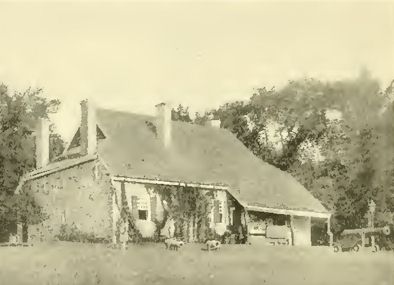
Washington's Headquarters at Newburg
|
Newburgh, May 22d, 1782.
Colonel Lewis Nicola.
Sir:-With a mixture of great surprise and astonishment,
I have read with attention the sentiments you have
submitted to my approval. Be assured, sir, no occurrence
in the course of the war has given me more painful
sensations than your information of there being such
ideas existing in the army as you have expressed, and
which I must view with abhorrence and reprehend with
severity. For the present the communication of them will
rest in my own bosom, unless some further agitation of
the matter shall make a disclosure necessary.
I am much at a loss to conceive
what part of my conduct could have given encouragement
to an address which to me seems big with the greatest
mischief that can befall my country. If I am not
deceived in the knowledge of myself, you could not have
found a person to whom your schemes are more
disagreeable. At the same time, in justice to my own
feelings, I must add that no man possesses a more
sincere wish to see ample justice done to the army than
I do, and so far as my powers and influence, in a
constitutional way, extend, they shall be employed to
the utmost of my abilities to effect it, should there be
any occasion. Let me conjure you then, if you have any
regard for your country, concern for yourself, or
posterity, or respect for me, to banish these thoughts
from your mind, and never communicate, as from yourself,
or anyone else, a sentiment of the like nature. With
esteem, I am sir,
Your most obedient servant, G.
Washington.
|
AHGP New York

Source: Stories from Early New York
History, by Sherman Williams, New York, Charles Scribner's Sons,
1906.
|